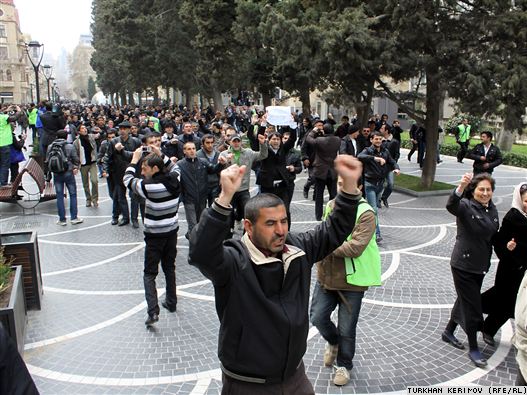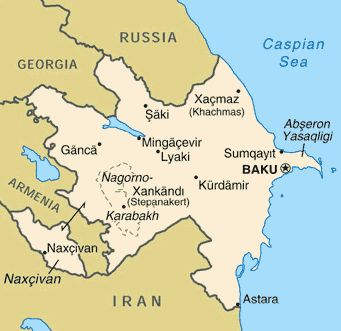Protesters in the streets were holding placards reading "We want freedom," "Ilham, go away," and chanting for President Ilham Aliyev’s "resignation" from office.
Police blocked off streets, arrested protesters
Police shut down the central Fountain Square and roads leading to the square were blocked by police buses. Hundreds of protesters gathered near the square before security services cleared the area. Police detained many on their way to the rally.
The police, arme d with batons, arrested protesters as they tried to reach Fountain Square, including women, and forced them into buses that took them to various police stations. RFE/RL correspondents saw police officers spraying tear gas through the bus windows into the detained activists’ faces.
d with batons, arrested protesters as they tried to reach Fountain Square, including women, and forced them into buses that took them to various police stations. RFE/RL correspondents saw police officers spraying tear gas through the bus windows into the detained activists’ faces.
Police tried to restrict the movements of journalists covering the developments around the square, pushing and kicking them. At least one journalist was briefly detained by security forces. Plain-clothes officers interrogated human rights activists attempting to observe the protests.
According to Azerbaijani public television, police detained at least 150 protesters, although non-governmental organization estimates are higher.
“The current Azerbaijani regime has a history of preventing and obstructing public gatherings,” said John Dalhuisen, Amnesty International’s Deputy Director for Europe and Central Asia.
“Their reaction to today’s protest and the demonstrations back in March this year starkly reveals the complete refusal of the authorities to tolerate any form of visible public protest.”
Denied permission
The rally was organized by the Public Chamber umbrella opposition group. The group had applied for a permit to rally in the central square, but the request was denied. They were told to rally at a location on the city’s outskirts.
City police officials told that opposition leaders and protest organizers were summoned and told to hold their rally only in the designated area.
Several opposition activists have been arrested in recent days before meeting and access to the opposition website Azadliq was blocked. During the protest several pro-opposition news websites experienced problems, and were inaccessible.
Four opposition activists charged
Four opposition activists have been charged over the April 2 rally. Three activists were ordered held in detention for two months – Arif Hajili of the opposition Musavat party, Tural Abbasli of Musavat’s youth organization, and Mammad Majidli, a member of the opposition Azerbaijani Popular Front Party (APFP).
The three, along with APFP deputy chairman Fuad Qahramanli, were charged with organizing "actions resulting in violation of public order and resisting and using force against government officials." Qahramanli was later released but will remain under police surveillance pending completion of the investigation.
The opposition umbrella organization the Public Chamber said the whereabouts of three other activists is unknown.
Some 13 activists were given administrative punishments ranging from three to eight days after riot police broke up the protest. The total number of those arrested before the protest was 17.
Trials behind closed doors
At least seven individuals have now been sentenced to administrative detention, most under Article 310.1 of Azerbaijan’s Administrative Code which bans "willful disobedience of a police official."
Code which bans "willful disobedience of a police official."
The majority of these trials took place behind closed doors, without the defendants having access to legal representation.
“The fact that key organizers are being arrested in advance, and sentenced in closed trials of offences that have yet to take place, is indicative of the length to which the authorities are prepared to go to silence dissenting voices,” John Dalhuisen from Amnesty International said.
Azerbaijan state TV has reported that the 2nd April protest is an attempt by foreign powers to destabilize Azerbaijan. State controlled television stations have also broadcast several programs depicting Facebook users as mentally ill.
"The overall detention of 174 people during and prior to a protest drawing less than 1,000 people is a big number," said Ambassador Bilge Cankorel, head of the OSCE’s Baku office.
"On the other hand, police did not interfere in the unsanctioned picket in front of a political party leader. The OSCE Baku office does not accept this different attitude."
The Public Chamber is planning its next major protest for April 16; a final decision will be made at its April 9 meeting.
The Public Chamber was established after the November 7 parliamentary elections. It includes several opposition parties, NGOs, and individuals.
More rallies planned
Inspired by popular uprisings in Arab countries, Azerbaijani opposition leaders said that more antigovernment rallies would be held in the future.
Musavat Party leader Isa Qambar said Baku residents joined the rally, and this "proved our predictions that the April 2 protest wasn’t going to be only an opposition protest, it appeared to be a protest by all the people."
Officials, however, insist it is unlikely that popular revolts will take place in Azerbaijan. Ali Hasanov, head of the presidential administration’s social and political affairs department, told local media that no more than a few hundred would join the opposition rallies.
The oil-rich Muslim country is a key energy supplier for Europe. President Ilham Aliyev came to power in 2003 after succeeding his father, Heydar Aliyev, who ruled the country for a decade.
Aliyev’s government is widely criticized for a lack of democratic reforms, corruption, cronyism, and clampdowns on opposition and free speech.
International criticism
The arrests have drawn condemnation from human rights groups and international organisations.
The Azerbaijani authorities must halt their crackdown on freedom of assembly, Amnesty International said after a "Day of Wrath" in Baku.
The Organization for Security and Cooperation in Europe (OSCE) criticized the authorities’ handling of the protest.
In a statement issued on April 1, the New York-based Human Rights Watch advocacy group said the arrests of opposition activists were "the government’s latest attempt to prevent the type of protests in North Africa and the Middle East from spreading to Azerbaijan. It is clear that the authorities are determined to crush any attempts by opposition activists to gather peacefully."
Related articles:
Azerbaijan: opposition activist and journalist abducted and beaten
Azerbaijan: at least 30 protesters sentenced
Azerbaijan: authorities detain dozens to prevent protests
Human Rights House Azerbaijan closed down by Azerbaijani authorities
Azerbaijan: Free speech activists call on journalist’s release
Fatullayev’s fate – in the hands of the Council of Europe Committee of Ministers
Azerbaijan: Human rights organisations demand to comply with European Court decision
Remembering a brave journalist in Azerbaijan
Azerbaijan: On 5. anniversary of editor’s murder, Article 19 calls to bring perpetrators to justice
Police use pressure against journalists in Azarbaijan
Azerbaijan: joint mission concerned by state of freedom of expression ahead of elections
Azerbaijan: freedom of expression situation has deteriorated over the past five years
Azerbaijani bloggers sentenced
No news is not good news regarding freedom of expression in Azerbaijan
Profound pessimism about Azerbaijan’s elections
Azerbaijan: free expression under attack before elections
Azeri authorities clamp down on election-related demonstration
New York Times’ article: Police in Azerbaijan arrest antigovernment protesters
Reports:
Free expression under attack: Azerbaijan’s deteriorating media environment
Statements:
Statement on the closing of the Human Rights House Azerbaijan
Youth activists targeted as freedom of expression clampdown continues


